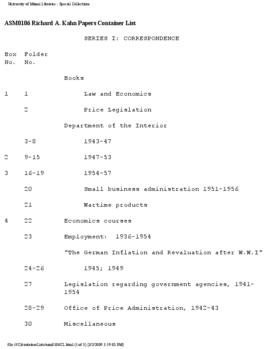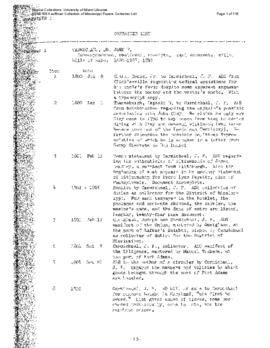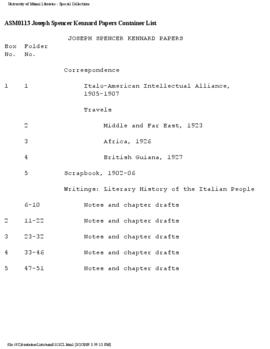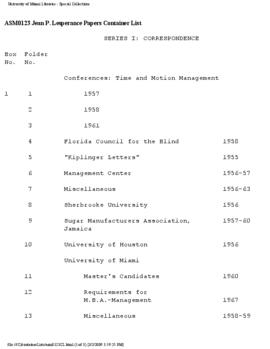The Kauffman Collection, comprised of the Mississippi papers, pertains to three generations of plantation families in southwestern Mississippi. The papers were first received in four wrapped bundles, or packages.
The first package of documents are those of Dr. John F. Carmichael produced from 1800 to 1845. The majority of these manuscripts date from the 1820s, but there is a good distribution of items from 1800 to 1837, the year Carmichael died. The last dated item, produced in 1845, is the distribution of Carmichael's own estate, as written by his nephew John Carmichael Jenkins.
These papers give a limited view of life in early Mississippi when it was part of West Florida, the Mississippi Territory, and after it became a state. As there is not much lengthy correspondence involved, it is difficult to obtain a deep understanding of activities around that time. The papers do, however, show that the early settlers in Mississippi were in rather dangerous and isolated territory; floods and disease were quite common, and food was simple and not in ample supply. The numerous receipts are effective in demonstrating the lifestyle of the people; what was bought and sold in the area indicates the degree of comfort in which the residents lived.
The quality of the materials themselves runs from fair to poor. Many items have pages missing or are torn, holed, brittle, and stained, some beyond easy identification. Most of the papers are small, single-paged items, but the legal documents and manifests are usually oversized and lengthy.
The second package in this collection is related to Dr. John Carmichael Jenkins, the nephew of the aforementioned John Carmichael. The materials were produced from 1827- to 1869. The bulk of these papers were written between 1835 and 1855, the years Jenkins lived in Mississippi. There are, however, two items which date from his years in Pennsylvania, and a copy of a sharecroppers' lease in 1869 for the Beverly Plantation, which apparently was in the control of Dr. Jenkins' elder son, John Jenkins, Jr.
These manuscripts are useful in understanding the business and social climate of the expansive and antebellum periods in Mississippi. They are more diverse and detailed than the letters to Carmichael. They show the lifestyle one would experience as a middle-class Southern farmer of the 1840s and 1850s.
The condition of the material is fair to good; most of the items are intact and only slightly faded. Colored paper is still in good shape, but the handwriting becomes harder to decipher than on the yellowed white paper generally used. Occasionally there is a page missing from a long letter, but almost everything is complete.
The third package of the Kauffman Collection contains those papers relating to Judge Josiah Winchester. These papers were produced from 1849 to 1893. There are many unsigned and undated drafts of letters, mostly dealing with Chinese labor immigration and miscellaneous notes and accountings.
These items were produced mostly from 1856 to 1888, with a thinning of the material from 1860 to 1865, during the Civil War, and again from 1874 to 1880. The earlier papers were probably left with this collection as received, the more important documents relating to wartime being removed. A single document from 1849 was received in this package, but it concerns lands belonging to the Bank of the United Sate (Pennsylvania) and probably not relative to Winchester. There are also a printed map of Adams County, Mississippi, and a length typewritten draft of a proposal sent to Congress concerning levee construction along the Mississippi, and a lengthy typewritten draft of a proposal sent to Congress concerning levee construction along the Mississippi River. These date from around 1893, five years after all documents with Winchester's name ceased to appear.
These documents are somewhat helpful in understanding legal procedure and domestic law during the 1860s and 1870s. Many of the receipts and bills are printed with handwritten inserts; the stationary shows some the flair of the period with its lettertype and occasional engravings.
The condition of the material is in a quite good state of preservation. There are few holed or brittle papers, and the ink quality has been retained. Unfortunately there are some incomplete letters and documents, some unsigned, and many undated.
The fourth and final package in this collection is the most fragmented. Here are papers and documents that are in disarray, belonging mostly to six groups. The papers of S.J. Hoggatt all relate to Judge Winchester: Winchester was Hoggatt's attorney. When the collection was received, however, these papers were separate from the rest of Winchester's correspondence. Most of Hoggatt's papers are letters to Winchester or bills received and paid through an account with the attorney. The period covered runs from 1870 to 1888.
The letters of the Dunbar family total seven items, running from 1799 to 1850. These probably belonged to Annis Dunbar Jenkins, but they too were separated from the Jenkins package when received. The Morgan Company and Morgan family papers, and an inventory concerning a lawsuit between family members over the ownership and distribution of George Morgan's estate.
The United States Bank at New Orleans seems to have been a part of the Bank of the United States in Pennsylvania; several of the tax receipts in the Jenkins collection belong with these papers concerning land deals and business transactions in Mississippi. Most of these items are business letters for the secretary for the bank trustees in Philadelphia to their agent, A. C. Ferguson, in Natchez. The time covered is from 1837 to 1866, but the majority of these papers were produced in the late 1850s.
The final group in the package consists of miscellaneous material relative to Mississippi. They run from 1803 to 1869, and some actually belong in Carmichael's, Jenkins', or Winchester's papers, but for some reason they were placed in this package when received. Other items in this group are single letters or unidentified notes which have nothing to do with the principle persons in this collection.
These papers are generally useful in understanding the activities of specific groups on a smaller scale. The Harris family letters give insight into the way of life experienced by poorer Mississippians after the Civil War. The Morgan family legal case demonstrates the greed and desperation for wealth after the collapse of the Southern economy during Reconstruction.
The material is in good condition except for the oldest of the papers, those being the Dunbar letters and a few of the miscellaneous papers from the early 1800s.






